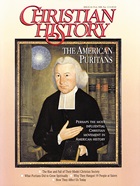John Eliot
(1604–1690)
Apostle to the Indians
A full 150 years before the modern missionary movement, John Eliot was successfully evangelizing native Americans. Yet forces beyond his control would destroy his life’s work.
Eliot’s wealthy English father sent him to Cambridge. Afterward Eliot taught grammar school and met Thomas Hooker, the man chiefly responsible for his conversion: “When I came to this blessed family I then saw, and never before, the power of godliness in its lively vigor and efficacy.”
In 1631, as church leaders applied heat to English Puritans, Eliot emigrated to America. He became pastor of the church in Roxbury, composed of many of his English friends. The following year, he married Ann (Hannah) Mumford.
The main legacy of Eliot’s early years is his work on the Bay Psalm Book (1640), which put the Psalms in metrical verse. This famous hymnbook was the first book published in America.
Eliot was frugal, eating just one plain dish for dinner. Of wine he said, “It is a noble, generous liquor … but as I remember, water was made before it.” He was deeply against the use of tobacco, and wigs or long hair on men.
However, Eliot cared deeply for the Indians. At Roxbury, he began learning Algonkian, and by 1647 was preaching in the native tongue. He began translating and in 1663 published the entire Algonkian Bible—the first Bible printed in America.
Eliot helped organize towns in which native Americans managed local affairs in their own way. By 1674, there were fourteen towns with a total of 1,100 “praying Indians.” He began giving some natives ministerial training.
Tragically, the bloody King Philip’s War (1675–76) between Wampanoags and the English, undid all his efforts. Though the “praying Indians” supported the English, the settlers panicked and confined them to an island in Boston Harbor. The war destroyed most copies of Eliot’s native American Bible and all but four of the Indian villages. More critically, it undermined the Indians’ trust in the English as well as English interest in native missions.
Eliot continued to minister to broken bands of Indians until his death.
John Winthrop
(1588–1649)
Sacrificial governor
In the late 1620s, English lawyer John Winthrop expressed the fears of many Puritans: “I am verylye persuaded God will bring some heavye affliction upon this lande [of England]. If the Lord seeth it will be good for us, he will provide a shelter and a hiding-place for us and others.”
When the Lord provided that hiding place in England’s American colonies, Winthrop played a significant role.
Young Winthrop entered Cambridge University in 1602. His marriage in 1605 cut short his academic pursuits. He lost two wives, one of whom bore him six children, in the next eleven years. But his marriage to Margaret Tyndal, daughter of a knight, in 1618, lasted until her death two years before his.
Winthrop considered becoming a priest but settled on law, becoming justice of the peace at Groton, and then lord of Groton Manor. He was an influential lawyer, frequently drafting petitions to Parliament.
Early on he was committed to Puritan ways. One diary entry reads: “O Lord, crucifie the world unto me, that though I cannot avoyd to live among the baites and snares of it, yet it may be so truely dead unto me and I unto it.”
Winthrop debated hard about moving to America. Before leaving, he helped alter the Massachusetts Bay Charter so it could be administered locally, not in England (as the Virginia colony’s was). Under the charter, Winthrop was elected governor, and in 1630, he set out with 600 to 700 people, not including his pregnant wife and three sons who were to join him later. While aboard the Arbella, Winthrop described a Christian commonwealth in the now-famous sermon, “A Modell of Christian Charity.” New England was to be a “city upon a hill.”
When Winthrop’s party arrived, the colony had only about 250 people. Suddenly, it stood at 1,000, with another 1,000 arriving soon afterward. This influx and the independent charter gave John Winthrop extraordinary influence.
In the beginning, the clergy censured Winthrop for his laxity in disciplining wayward behavior (even though he had banished Roger Williams). He determined “to take a more strickt course heareafter,” shown, some say, in his severity with Anne Hutchinson.
Winthrop ruled with a strong hand, partly because he felt that liberty requires secure authority. To him democracy was essentially mob rule. Though he believed in representative government, once elected, the elected should rule by their consciences.
In general Winthrop was judicious, modest, and self-sacrificing. An audit of his first years as governor revealed he donated large sums of his own money to the commonwealth. A popular magistrate, he served as governor for 12 of his 19 years in America. One of his sons and one of his grandsons were later governors of Connecticut.
John Cotton
(1584–1652)
Controversial preacher
When he was only 27, John Cotton was chosen vicar of the large and beautiful St. Botolph’s Church at the English seaport of Boston, Lincolnshire. Typical of Cotton’s later life, the appointment was shrouded in controversy: the election was won only because the mayor inadvertently cast his vote twice, and the bishop’s approval was secured only by a bribe (of which Cotton was not aware).
Cotton, the son of a lawyer, did not have a religious awakening until his days at Emmanuel College, Cambridge, where he lectured and served as dean.
By the time of his appointment to St. Botolph’s, he was a committed Puritan. He began omitting certain practices from the order of worship, and within three years he was in trouble with the authorities. In 1632 he was summoned before the Court of High Commission, but discretion won over valor, and he sailed for America.
He arrived in Boston, Massachusetts, on September 4, and by October 10 his reputation had won him the position of teacher of First Church.
Cotton was involved in the two earliest controversies to rack the colony. One of his members, Anne Hutchinson, claimed that Cotton and one other minister were alone, out of all the clergy of Massachusetts, “under the covenant of grace.” Cotton eventually had to distance himself from her increasingly radical views on grace, which he had taught her, in England and America, in more orthodox form.
He also had a book war with Roger Williams. Cotton believed that government could enforce religious beliefs and practices. Williams fiercely objected in The Bloudy Tenent of Persecution (1644), and Cotton defended his views in The Bloudy Tenent, Washed and Made White in the Bloud of the Lambe (1650)—only to have Williams counter with The Bloudy Tenent Yet More Bloudy (1652)!
Cotton became famous for his vivid and forceful preaching; sometimes his Sunday morning prayers and sermon lasted six hours. His catechism, Milke for Babes (1646), was the standard for New England children for decades.
Cotton married twice. His second wife survived him and married another American Puritan giant, Richard Mather. And his daughter Maria married Increase Mather and became the mother of Cotton Mather, two other titans of Puritan Massachusetts.
Anne Bradstreet
(1612–1672)
America’s first poet
Anne Bradstreet seems to have been born in a castle, in Northampton, England, where her father was a steward for the Puritan Earl of Lincoln. She enjoyed the advantages of privilege and wealth, once noting, “When I was about seven … I had at one time eight tutors … in languages, music, dancing.”
At age 16, Anne married Simon Bradstreet, a recent graduate of Cambridge and also a steward at the Earl’s estate. Two years later, in 1630, she came to Massachusetts with a group of Puritans led by John Winthrop.
These sudden changes didn’t suit her: “I changed my condition and was married, and came into this country, where I found a new world and new manners, at which my heart rose [in anger],” she later wrote her children. “But after I was convinced it was the way of God, I submitted to it and joined to the church at Boston.”
After that, she led the demanding but relatively comfortable life of a mother (eventually bearing eight children) and wife of a husband who traveled in the highest circles of Massachusetts society. Between her domestic chores, she found time to write poetry. Her brother-in-law thought it so good, he managed to get a few of her poems printed in England, under the title, The Tenth Muse Lately Sprung up in America.
Though she is today considered the first American poet, and though her poetry was admired by many contemporaries, she was criticized by some for writing poetry:
I am obnoxious to each carping tongue
Who says my hand a needle better fits,
A Poet’s pen all scorn I should thus wrong,
For such despite they cast on Female wits.
Still she composed poems: about nature, about marriage, about children, about faith—sometimes all at once. As one historian put it, her poetry shows “a Puritan could … combine sexual passion, love of children and good furniture, humor—that the female Puritan, in short, could be both a Puritan and a woman of great charm.”
One of her most poignant poems was written in 1665 upon the death of an infant grandchild;
Farewel dear babe, my hearts too much content,
Farewel sweet babe, the pleasure of mine eye,
Farewel fair flower that for a space was lent,
Then taken away unto Eternity.
Blest babe why should I once bewail thy fate,
Or sigh the dayes so soon were terminate
Sith thou art sealed in an Everlasting state.
By nature Trees do rot when they are grown.
And Plumbs and Apples throughly ripe do fall,
And Cord and grass are in their season mown,
And time brings down what is both strong and tall.
But plants new set to be eradicate,
And buds new blown, to have so short a date,
Is by his hand alone that guides nature and fate.
Thomas Hooker
(1586–1647)
Founder of Connecticut
Thomas Hooker traveled to America with two other Puritans, and when they arrived in 1633, the joke went around that New England now had “[John] Cotton for their clothing, Hooker for their fishing, and [Samuel] Stone for their building.”
Yet rather than stabilize the fledgling colony, as the saying suggested, Hooker’s first actions seemed to threaten it.
Hooker had attended and lectured at Cambridge University’s Emmanuel College, practically a Puritan institution at the time. His lectures and preaching won him wide recognition.
But by the late 1620s, Puritan views were becoming more suspect, and in 1630, an ecclesiastical court ordered Hooker before the High Commission. Instead, he forfeited bail and fled to Holland. Eventually he made his way to Massachusetts, where he was ordained as pastor of the church at Newtown (now Cambridge).
Within six months of his arrival, the townspeople sent out a party to seek a place to relocate. They said they were anxious for more land. But there is some evidence they were growing restive under the Massachusetts Bay authorities.
In 1634, the group applied to these authorities to move to the banks of the Connecticut River. John Winthrop objected: such a move would undermine the oath the town had made of “being knit to us in one body … to seek the welfare of this commonwealth.”
In a close vote, the petition was denied. But within months, other communities began moving west, some with official permission, others without. And in May 1636, most of the town of Newtown did the same; led by Hooker, they established Hartford. The Fundamental Orders (1639), composed by Hooker, outlined a government essentially the same as the Bay colony’s, though with more emphasis on the role of the people.
Hooker moderated the landmark council that formulated the Cambridge Platform (1649), a key expression of Congregational polity for all New England churches. His untimely death in 1647, of an “epidemical sickness,” prevented him from seeing the fruits of his efforts.
He had married Susan Garbrand in 1621, and he left her and three children upon his death.
Mark Galli is managing editor of Christian History.
Copyright © 1994 by the author or Christianity Today/Christian History magazine.
Click here for reprint information on Christian History.

Support Our Work
Subscribe to CT for less than $4.25/month




























